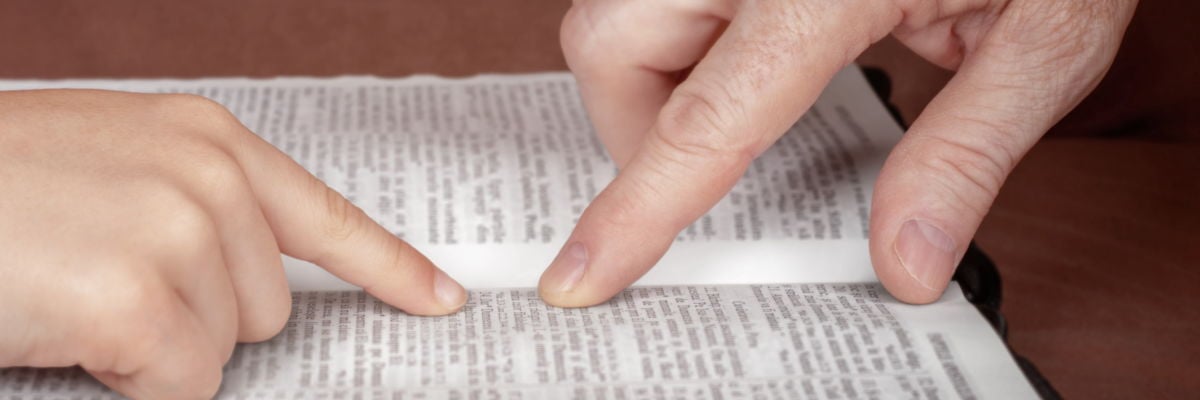
It is not unusual to hear Protestants say that Catholics can’t prove their beliefs from the Bible. Although we do fine with the Trinity or the divinity of Christ, they say, when it comes to its distinctive doctrines Catholicism must depart from the Bible and rely on human tradition.
Protestantism, on the other hand, is said to derive its teachings by Scripture alone (sola scriptura). Thus, if a teaching can’t be proved from the text of the Bible, Protestants are free to reject it. That’s the theory, at least.
There’s a problem with “prooftexting,” though: it cuts both ways. Baptists chide Catholics for calling priests “Father” when the Bible says to “call no man ‘father’” (Matt. 23:9). But the Bible also says, “Baptism now saves” (1 Pet. 3:21)—and the Baptist movement is based on the belief that baptism doesn’t save.
Protestants typically consider the Catholic distinction between mortal and venial sins to be bogus (pointing to James 2:10), but it’s right there in the Bible (1 John 5:14-21).
Protestants say that trusting oral tradition violates Paul’s admonition not to “go beyond what is written” (1 Cor. 4:6), but Catholics follow the biblical command to hold to apostolic traditions whether they are “by word of mouth or by letter” (2 Thess. 2:15).
Both sides, then, must exercise caution when simply citing passages that sound like they support certain positions.
Another issue is that, in reality, there are few prooftexts that cannot be “theologized” into agreement with one’s own doctrinal position. Once again, Protestantism provides some of the most compelling proof that this is the case. Consider its other foundational doctrine: justification by faith alone (sola fide). This idea is an exact contradiction of James 2:24, yet Protestants have no trouble theologizing their way out of it.
Regardless of which interpretation is correct, the point is that if Protestant interpreters can justify (pun intended) even a direct contradiction of Scripture, then Catholicism can emerge unscathed from any charge of teaching unbiblical doctrines.
A final difficulty with prooftexts is that Scripture itself seems to teach opposing things at times, requiring one’s theology to resolve the dispute. For example: Does God change (Gen. 6:6) or not (Mal. 3:6)? Does God have a body (Psalm 89:13) or not (John 4:24)? And in the above case, are people justified by works (James 2:24) or not (Rom. 3:28)? (Luther thought this last example could not be resolved, so he added the word “alone” to Romans 3:28 and judged the Book of James to be an “epistle of straw.”)
These problems are not Catholic or Protestant problems – they’re Bible problems. No matter how one resolves these seemingly contrary statements, it is Scripture itself that causes them to need resolution—and it is tradition (of some kind) that does the resolving.
Given some Protestant claims, you might think that Christians who “only believe their Bible” would be in substantial agreement with one another and significant disagreement with those who add tradition into the doctrinal mix. Is this the case? Let us consider some of the more contentious issues between Catholics and Protestants and see the results.
Baptism
Based on Sacred Scripture and Tradition, Catholics believe that baptism is performed primarily by immersion or infusion, and that it is a salvific act (e.g., Mk. 16:16, Jn. 3:5; Acts 2:38; 1 Pet. 3:21; cf. Catechism 1213).
Based on the Bible alone, Protestants have developed several views. Some believe Baptism is merely a symbolic profession of faith that nonetheless must be by full immersion. Others think of baptism as being the occasion of regeneration by immersion. Some practice infant baptism (often by sprinkling) as a regenerative act, others as simply fulfilling the New Covenant.
Communion
Based on Sacred Scripture and Tradition, Catholics believe that the communion elements of bread and wine actually become Jesus’ body and blood in substance even though they retain the accidental appearance of bread and wine (John 6:54; Matt. 26:26; 1 Cor. 11:27-29; CCC 1374-1381).
Based on the Bible alone, Protestants have developed several views. Some say communion is nothing more than a reminder of Jesus’ sacrifice whereas others see it as Jesus’ spiritual presence. Still others believe that Jesus and the communion elements are both present (somehow).
Atonement
Based on Sacred Scripture and Tradition, Catholics reflect a multi-faceted description of Jesus’ atoning work. Thus, Catholics include the accurate elements of some views while avoiding the errors of others (Jn. 5:24; Lk. 5:31-32; Lk. 15; cf. Catechism 599-615).
Based on the Bible alone, Protestants believe . . . you guessed it. Numerous views are represented throughout various denominations and theologians, including penal substitutionary, subjective, Christus Victor, and governmental views. Further, some believe that Christ’s atoning work secured the redemption of God’s elect alone, whereas many others teach that Christ’s death provided atonement generally for all mankind but its actual extent is based on faithfulness. All profess the doctrine of sola fide but there is rampant disagreement over what constitutes saving faith or how works are related to the salvation process.
Traditions of Men
Protestants relying on the Bible alone for their doctrinal beliefs do not seem to be doing very well “proving” their beliefs—even to each other. In many cases it seems that the only thing Protestant groups agree on is that they are not Catholic!
Protestants sometimes use the expression “traditions of men” to refer to Catholic doctrines and practices thought to be wholly absent from Scripture (cf. Mark 7:8-13). Beliefs such as purgatory, the papacy, or praying to Mary may not have enough scriptural support to satisfy Protestants, but this is not just a problem for Catholics. Numerous Protestant beliefs and practices lack overwhelming biblical support as well.
Important aspects of the Nicene and Chalcedonian creeds and canons, specifics concerning the Trinity and Incarnation, communion for women, meeting in church buildings, denominationalism, youth pastors, altar calls, and the canon of Scripture itself are all “extra-biblical” teachings. Indeed, if some teachings not being explicitly found in the Bible is a problem for Catholics, it might be an even bigger problem for Protestants—for not only do Protestants lack a clear biblical basis for some of their particular beliefs and practices, these traditions also do not possess the historical pedigree or authoritative sources that Catholicism can claim.
Sola Scriptura vs. Sola Verbum Dei
The basic problem with sola scriptura is that the Bible was never meant to be the single source for Christian faith and practice. The best evidence of this fact is Protestantism itself. Sola scriptura has produced a truly staggering list of doctrinal disagreements over almost every imaginable subject. These are remarkable both for their quantity (Protestant publishers have entire series devoted to intramural doctrinal debates) and quality (disagreements exist even over basic, essential issues of the Christian faith).
Although the Bible is indeed “useful for teaching” (2 Tim. 3:16) it simply cannot function as the sole ultimate authority for Christians. Although it is the only inspired collection of documents we possess, the Bible must still be interpreted. This is why God gave us a Church and not just a book (see 1 Tim. 3:15).
Jesus promised that the apostles would be led into all truth (John 16:13) and that the Church he founded on them would never fail (Matt 16:18). This Church was empowered by the Holy Spirit to make doctrinal judgments that could not be settled by Scripture alone (e.g., Acts 15). This is why the Catholic Church plainly affirms that revealed truth does not come from Scripture alone and teaches that “both Scripture and Tradition must be accepted and honored with equal sentiments of devotion and reverence” (CCC 80-82).
Catholics cannot “prove” many of their doctrines from Bible texts for the same reason Protestants can’t: the Bible is not beyond misunderstanding and contrary interpretations (e.g., 2 Pet. 3:16) and was never meant to function as a standalone authority. When it is treated as such, the Bible becomes a source for division rather than unity. Protestantism itself has eloquently shown this to be true. Without Sacred Tradition to safeguard Sacred Scripture, it’s anybody’s game.
At the end of the day, all Christians rely on extra-biblical tradition to understand the Bible. The difference is that Catholics acknowledge that this is so.



